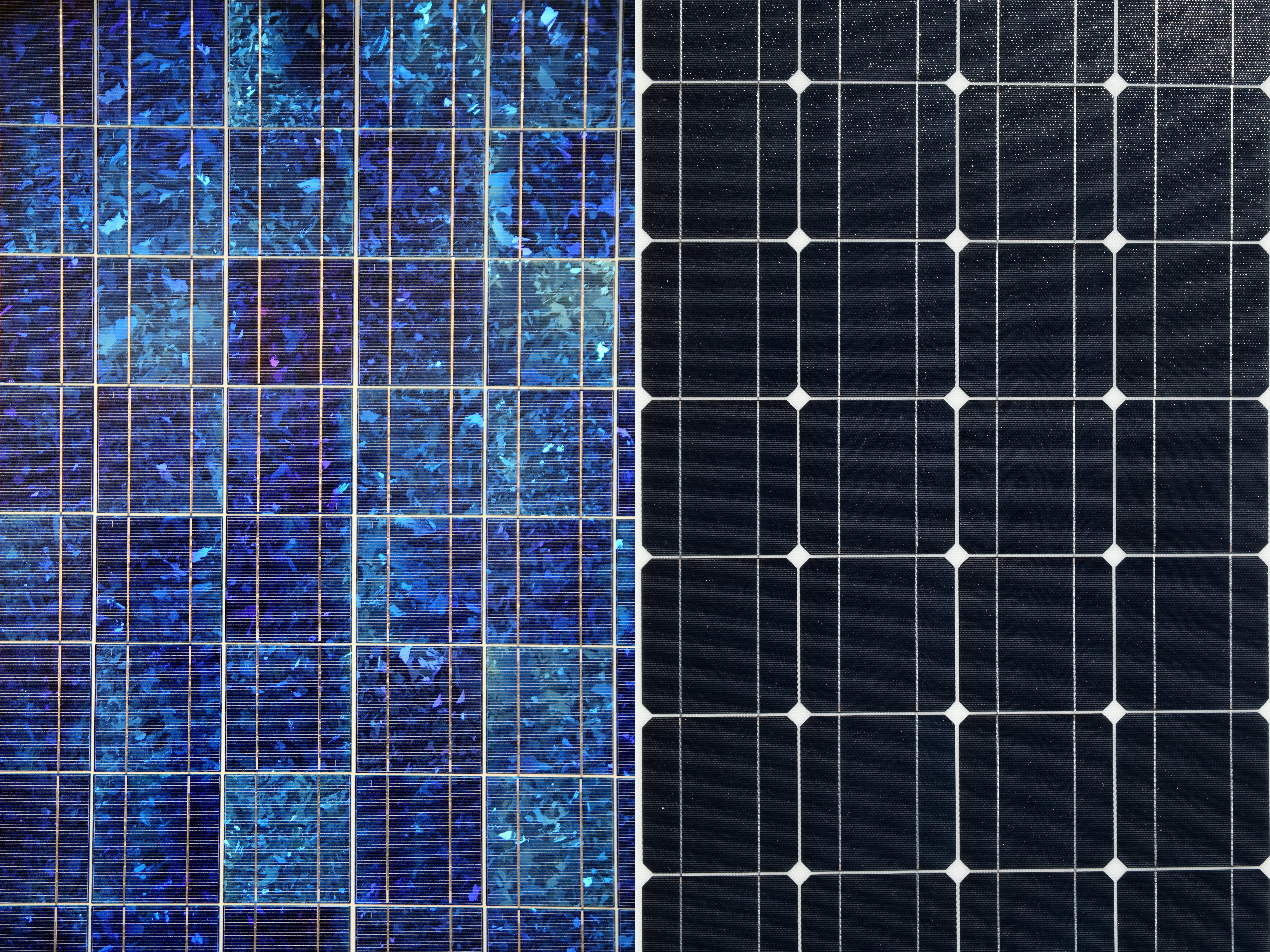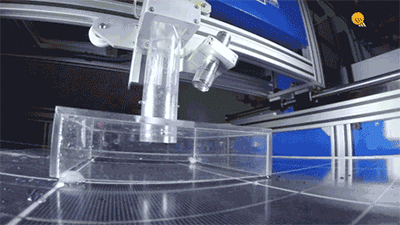Above image: A Namaste Solar install using REC panels, our recommended solar panels.
Blog Updated: June 2024
When it comes to choosing the best solar panels to purchase for your home, there are many factors to consider including efficiency, warranty, and aesthetics.
We won’t compare every solar panel on the market, but we can walk you through the criteria that we use to select the best solar panels for our installs. As the longest-running Colorado solar company, our solar experts know what features to look for and what differentiators will best help you produce clean energy.
Polycrystalline vs. Monocrystalline Solar Panels
To start, let’s go over some solar panel basics.
There are two types of solar panels that are typically used in residential installations: monocrystalline and polycrystalline. While both types are made of silicon and both will convert sunlight into electricity, there are several vital differences between the two.
Monocrystalline solar panels are the premium option between the two types of panels, and it is the type that Namaste Solar installs on homes. As the name “mono” implies, monocrystalline panels are made up of individual wafers of silicon which are cut up into cells. Each cell is made from a single wafer of silicon, thus the composition of the cells are purer. Because of this, the monocrystalline cells are better at converting sunlight into electricity. Monocrystalline solar panels usually have a black hue.
On polycrystalline solar panels, the cells are formed by melting silicon fragments together on a big sheet as opposed to individual cells. Because there are multiple crystals in each cell, the electrons have less space to flow. These solar panels are less expensive but not as efficient as monocrystalline solar panels. Polycrystalline solar panels typically have a blue hue.

From left, a polycrystalline solar panel and a monocrystalline solar panel.
Why Solar Panel Warranty Matters
Warranty is among one of the top factors to consider when weighing which are the best solar panels.
One of the most important considerations we look for in a warranty is whether there is a production (aka performance) warranty. Performance warranties state that the solar panels will produce a certain percentage of their rated power output by the end of the warranty period. Industry standard on solar panel performance warranties is usually around 86% while higher performance panels will have a performance warranty closer to 92%. A high-quality panel will have degradation of .33% or less per year. Remember - the higher the performance warranty, the more electricity your system will provide over its lifetime!
Other warranty factors to consider are the labor warranty reimbursement and workmanship warranties. These two warranties come on all panels.
- A labor warranty reimbursement covers a panel malfunction, which is rare. Most manufacturers will cover one-way shipping costs and provide a new or refurbished panel. The labor it will take to de-install and re-install the solar panel is not included. In those instances, a customer would be billed for the labor.
- A workmanship warranty is based on how well the solar panel is made. The standard is between 10-12 years and the best solar panels have a 25+ year workmanship warranty. If you live in an area with temperature extremes like Colorado, you’ll want to make sure your solar panels have a good workmanship warranty.
Look for Solar Panel Efficiency
When weighing differentiators to decide on the best solar panels, homeowners should also consider efficiency, not just wattage. The wattage of a panel represents the potential power that panel can produce under ideal conditions, but wattage doesn’t indicate how efficient your solar panels are. You can put two solar panels of the same wattage from different manufacturers next to each other and the one with the better efficiency rating will produce more electricity per square foot than the other one. When purchasing solar panels for your home, you’ll want to ask, “how efficient is the overall panel?”
A higher efficiency panel means you'll need less roof area to meet your electricity production goals. It also means you'll need fewer panels, which can reduce labor costs for installation.
Most solar panels currently run at about 19-21% efficiency. However, some manufacturers’ most efficient solar panels can reach 22%. For example, REC, a company that makes some of the most efficient solar panels on the market, offers premium solar panels with an efficiency of 21.7%. We install solar panels that run from 20.3 – 21.7% efficiency.
Hail and Solar Panels
Hail and the damage it can inflict on solar panels, especially in hail prone states like Colorado, is one of the biggest concerns among homeowners who go solar.
Today’s solar panels are designed and thoroughly tested to hold up against the elements, anything from high winds to hail. Most manufacturers put their solar panels through a rigorous testing and certification process to withstand use. Many solar panels are manufactured to endure hurricane force winds. The aluminum and glass casings that encapsulate solar panels are highly waterproof, designed even to repel extreme rain.

REC solar panels being tested against hail
The best solar panels will work in various environments and climates, whether you’re in a desert, by the seaside, or in the mountains. While solar panels are not indestructible per se, they should be rugged enough to hold up against some of the roughest conditions Mother Nature has to throw at it.
Who Makes the Best Solar Panels?
After being in business for nearly two decades, we’ve had a front-row seat to the development of solar panel technology and have seen dozens of solar panel manufacturers come and go. We know which ones will be around for the long haul to honor warranties because they’ve produced the most robust and efficient products. We prioritize the best solar panels because they maximize your solar savings and increase your positive impact on the environment.
When shopping around for the best solar panels, there are a few questions that are important to ask.
- How long has the manufacturer been around?
- What is their warranty like? This includes their performance warranty.
- Will they still be in business long enough to honor their warranty?
- What is their solar panel efficiency?
- What is the manufacturer’s testing and certification process against severe weather conditions?
Based on these criteria, we most often recommend REC solar panels for your home, specifically the REC Alpha Pure 420 panels. The 420 panels are smaller which means we can fit more on your roof to offset more energy and you get more kWh for the lifetime of the system, they have higher efficiency, and are lead free. Here's some specs for the Alpha Pure 420 panels:
- Performance warranty of 92% - Performance warranties refer to the percentage of year one production you can expect in year 25. So, these panels will produce 92% of the electricity that they produced in year one by year 25. Another way to look at it is that they'll degrade 8% in 25 years. Industry standard for degradation and performance warranties is 86%.
- Efficiency of 21.7% - Higher than the average efficiency of some of the best performing panels.
- All black panel - A more modern, sleek, and aesthetically pleasing look is the standard with the REC Alpha Pure 420 panels. Gone are the days of metal on black either in the border or within the panel.
REC Alpha Pure 420 Solar Panel
REC manufactures some of the most efficient solar panels on the market and they also currently offer the best warranty on the market – 25 years, including a partial labor warranty. REC has been in business since 1996 and they've only produced solar panels in that time, leading to decades of experience and expertise. Because of REC’s longevity as a company, we are confident that they’ll be around long enough to honor their promised 25-year warranty, should it be needed. We especially appreciate that REC believes that "the best warranty is one you never have to use." That's what they are offering with their REC ProTrust Warranty which is offered exclusively by trained REC Certified Professional Installers (that's us!).
Plus, REC’s internal testing is up to three times as rigorous as the industry standards so they feel confident that their panels will endure even in the most extreme environments.
 The house in the forefront is a Namaste Solar install using REC panels
The house in the forefront is a Namaste Solar install using REC panels
Besides their other great qualities, REC also utilizes heterojunction technology (HJT), which is a solar panel production method that increases the efficiency and power output of the panels to reach their highest levels. HJT produces a hybrid cell that exceeds panel performance standards including higher efficiency in hot conditions and improved output when shaded.
Want to learn more about which are the best solar panels for your home? Have a no-pressure conversation with the solar experts at Namaste Solar to evaluate the value of solar for your home.
Recommended Reading:
- Are Solar Panels Worth It for Your Home?
- How Much Does It Cost to Go Solar, Anyway?
- Hail & Solar Panels: How Much Hail Can Solar Panels Handle?


